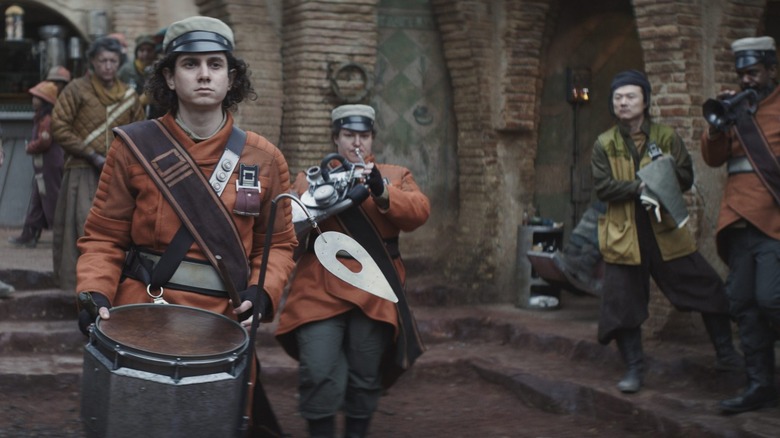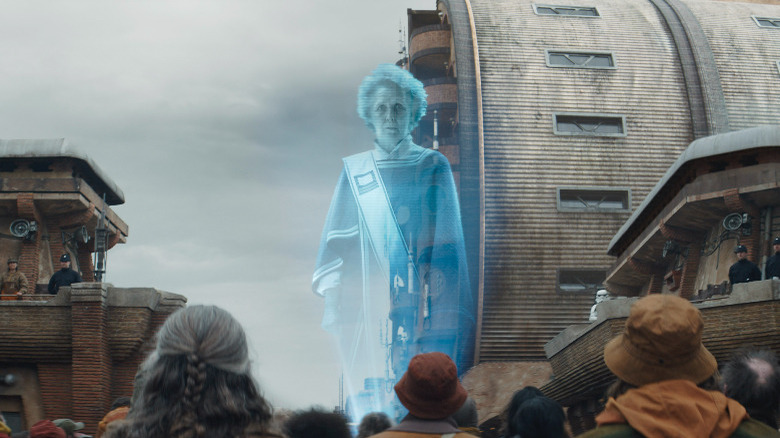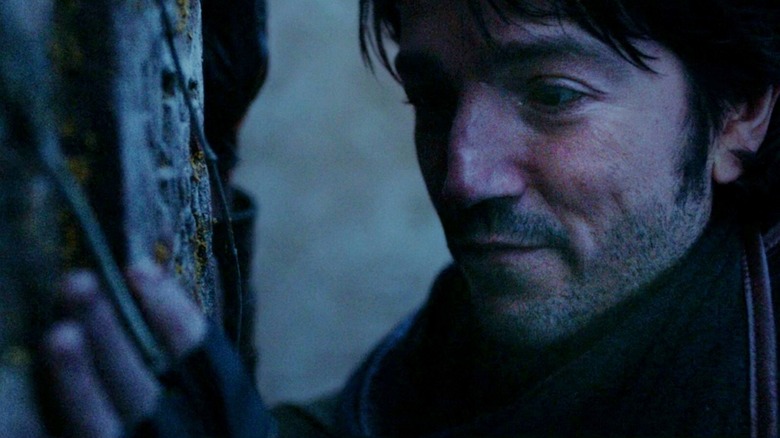The Andor Season 1 Finale Features The Finest Use Of Diegetic Music In Star Wars History
This post contains spoilers for the "Andor" season 1 finale.
George Lucas has famously said in the past that sound is 50 percent of the moviegoing experience. When you have John Williams as a composer, that number might even need to go up. Arguably, the main title theme in "Star Wars" is the most impactful piece of music in cinema history, and expressing that opinion really doesn't feel too hyperbolic. Throughout the entire canon of "Star Wars," the symphonic themes and orchestral bursts are sonic cues that let the audience know when to feel something, when to react, and when to cheer.
The achievements of composer and conductor John Williams cannot be overstated, but there are also other composers that have added to the songbook of "Star Wars," including Michael Giacchino (who only had four weeks to score "Rogue One") and the underrated contributions of Kevin Kiner on "Clone Wars" and "Star Wars Rebels." On rare occasions, we're offered a glimpse of the music within the worlds of "Star Wars" instead of the bombastic fanfare that has become such a crucial component of the franchise over the years. The astral jazz fusion of Figrin D'an and the Modal Nodes on Tatooine or the incredibly catchy Ewok celebration song "Yub Nub" at the end of "Return of the Jedi" give us an idea of what the inhabitants of the galaxy are actually hearing themselves.
The music in "Andor" has been different from the start. In "Rix Road," the touching and thrilling conclusion of the first season, a ragtag funeral procession for Cassian's mother Maarva (Fiona Shaw) presents a brand new addition to the sounds and melodies that happen in-universe on the desert planet of Ferrix. The onscreen diegetic music emanates from brass-like instruments and a somber drumline that may end up being one of the most emotional uses of music in "Star Wars" history.
A funeral fit for a rebel
It's certainly not easy to recreate the classic themes from John Williams, but there is a large swath of material to choose from. Over 18 hours of recorded music is featured in the entire "Star Wars" film series, with literally thousands of pages of sheet music. It's a rich collection that, sadly, is coming to an end seeing how Williams is planning to retire after "Indiana Jones 5" brings that other Lucasfilm franchise to a close.
With that monumental absence from the "Star Wars" universe, a musical void is left that may hopefully have a silver lining. The in-universe music could see more screen time in future installments that reveal more about the myriad of cultures within the vast array of planets and moons located in the Core Worlds and Outer Rim Territories. Maarva Andor's funeral procession in "Rix Road" is a prime example of how the local flavor and music of the people of Ferrix can potentially move us just as much as a stirring, recognizable theme.
The music feels real because it was actually happening there on the day. In a brand-new interview, writer and showrunner Tony Gilroy told /Film how he approached creating the music heard on the ground. "I want it really played," he said. "I want it to be amateur, and I want it to be aspirational. I want it to be a civic experience."
Those moments of catharsis feel like a sort of intergalactic second line parade that binds the local people of Ferrix together — and just in time for Maarva's hologram to project an inspiring final speech that galvanizes the crowd to rise up against the Empire.
We have each other
The street music played at Maarva Andor's funeral features everyday citizens picking up instruments before taking up arms against the Empire. The music represents the cultural heart of the community, and Maarva's words, as one of the esteemed Daughters of Ferrix, work almost like lost lyrics that are suddenly unearthed. Her speech becomes a protest song. With her heartfelt eulogy, she says they've ignored the Empire's meddling presence for far too long. Ferrix was in the free trade sector and remained mostly independent, but by the time "Andor" season 1 ends, the freedom of the people is being taken away.
In "Rix Road," the musicians in the funeral march become a part of the cultural makeup of Ferrix just as much as the Time Grappler ringing the beskar anvil at the beginning of each day. The notes they play could only come from these people, a fact that Gilroy wanted to make sure and get right. "This was our attempt to be somewhat terrestrial and to have something that hopefully could only exist in Ferrix," he told us.
The amateur tune they play represents a moment of mourning instead of signifying a time for celebration, which is another reason why it stands out. In a franchise that generally uses rousing orchestral scores and euphonious music to make us feel something, the muted, off-key melody in the funeral scene of "Rix Road" puts us right there on the ground with the other rebels.
"Andor" season 1 is streaming on Disney+.


